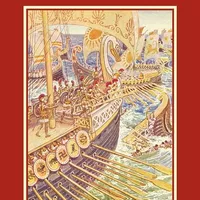19. The Dawn of History
"The isles of Greece, the isles of Greece." —BYRON.
While the heroic age of Greece is passing with its memories of the Argonauts, the siege of Troy, and the adventures of Ulysses, let us take a look at the country, which was destined to become so great a power in the world.
One glance at the map will show, that Greece was cut up into little States. Why was this? Greece is naturally cut up into little pieces by its mountains, and deeply indented by its sea. One part is entirely divided from another part, by deep ravines with steep sides, and across these ravines no man could walk. Intercourse, therefore, between such a people was very difficult, often impossible.
See how different Greece is from Egypt. Egypt is a rich flat land stretching away on either side of the river Nile. The Egyptians could sail up the Nile with the wind, and drop down it, with the current, so that it was always quite easy to go from one part to another.
And so it was that from the very earliest times Egypt was one country under one king, like the Pharaohs of Bible history.
In Greece it was all different. There is no one flat tract of land anywhere. The great ranges of mountains divide it into a number of small districts, and each of these districts must have its own chief or king. These old Greeks were a free and hardy race, full of imagination and adventure, loving their old stories, loving their mountains, their sea, their freedom. Further than this, they enjoyed a climate which would breathe life into the dullest race; a climate, that clothed their mountains and islands with a beauty, of which their poets have ever loved to sing, which has raised them to that keen sense of beauty and art famous, throughout all ages.
To such a people, shipping became a necessity. They would learn the art of shipbuilding from the Phœnicians, who had long since made a settlement on the rocky crag, rising from out the plain known as the Acropolis, or Rock City. Thither came the Phœnicians, when the Greeks were but mere farmers, until very soon, on the Greek coast too, a new and busy life began. The Greeks had much to learn from the seafaring men from Tyre and Sidon, who came more and more to the Greek coasts, exchanging their own goods for Grecian products. In time the Greeks on the coast came to know all the Phœnicians knew: they took their alphabet, their weights and measures; they made ships like those used by the Phœnicians, and began to sail along their own shores.
It was therefore somewhat natural, that after a time the Greeks should turn their eyes eastwards across the blue waters, now known as the Archipelago, to the fertile shores of Asia Minor. Vast fields of rich grain and orchards of fruit, tempted the new settlers, until shipload after shipload had left the mother country, and scattered themselves along the opposite shores of Asia Minor, known as Ionia.
There is an old story of this Ionian migration, which says, that a certain king in Greece died, and his sons, not caring to live on in a country, where they could not live as princes, decided to leave it. They assembled at the Acropolis while their ships were preparing, and after a tedious voyage across the Archipelago, they landed on the coast of Asia Minor. They soon began to build cities, and before long, there were no less than twelve beautiful seaport towns on the Ionian coast belonging to Greece.
The chief of these were Miletus and Ephesus, both of which we shall hear of again. Miletus was stoutly defended by the natives already living there, which so enraged the Greeks that they slew every man they found and made the widowed women their wives. Legend relates, that the women were so heart-broken at this conduct, that they refused to sit at meat with their new husbands, or to call them by their names.
Ephesus rose to great importance as a seaport, and was also famous for the wonderful temple built to the goddess Diana, a worship which filled St Paul with such sorrow, when he spent three years among these Ephesians.
These towns had their day; they rose and fell, and nothing remains of them to-day, save reedy swamps and fever-stricken haunts, where once arose a perfect forest of masts, belonging to the ships trading with all parts of the then known world.

